Related Research Articles

The Allman Brothers Band was an American rock band formed in Jacksonville, Florida, in 1969 by brothers Duane Allman and Gregg Allman, as well as Dickey Betts, Berry Oakley (bass), Butch Trucks (drums), and Jai Johanny "Jaimoe" Johanson (drums). Subsequently, based in Macon, Georgia, they incorporated elements of blues, jazz and country music and their live shows featured jam band-style improvisation and instrumentals.
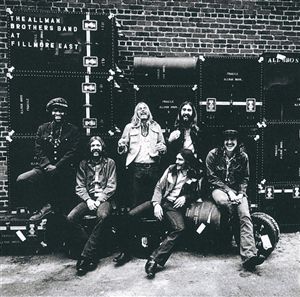
At Fillmore East is the first live album by American rock band the Allman Brothers Band, and their third release overall. Produced by Tom Dowd, the album was released on July 6, 1971, in the United States by Capricorn Records. As the title indicates, the recording took place at the New York City music venue Fillmore East, which was run by concert promoter Bill Graham. It was recorded over the course of three nights in March 1971 and features the band performing extended jam versions of songs such as "Whipping Post", "You Don't Love Me" and "In Memory of Elizabeth Reed". When first commercially released, it was issued as a double LP with just seven songs across four vinyl sides.

Eat a Peach is a 1972 double album by American rock band the Allman Brothers Band, containing a mix of live and studio recordings. Following their artistic and commercial breakthrough with the July 1971 release of the live album At Fillmore East, the Allman Brothers Band got to work on their third studio album. Drug use among the band became an increasing problem, and at least one member underwent rehab for heroin addiction. On October 29, 1971, lead and slide guitarist Duane Allman, group leader and founder, was killed in a motorcycle accident in the band's adopted hometown of Macon, Georgia, making it the final album to feature him.

Howard Duane Allman was an American rock and blues guitarist and the founder and original leader of the Allman Brothers Band, for which he was posthumously inducted into the Rock and Roll Hall of Fame in 1995.

Gregory LeNoir Allman was an American musician, singer and songwriter. He was known for performing in the Allman Brothers Band. Allman grew up with an interest in rhythm and blues music, and the Allman Brothers Band fused it with rock music, jazz, and country at times. He wrote several of the band's most popular songs, including "Whipping Post", "Melissa", and "Midnight Rider". Allman also had a successful solo career, releasing seven studio albums. He was born and spent much of his childhood in Nashville, Tennessee, before relocating to Daytona Beach, Florida and then Macon, Georgia.
Hour Glass was an American soul band based in Los Angeles, California in 1967 and 1968. Among their members were two future members of the Allman Brothers Band and three future studio musicians at the FAME Studios in Muscle Shoals, Alabama.
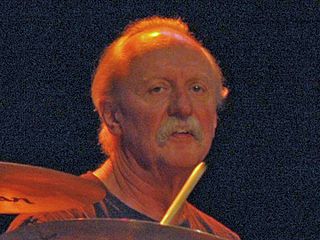
Claude Hudson "Butch" Trucks was an American drummer. He was best known as a founding member of The Allman Brothers Band, for which he was inducted into the Rock and Roll Hall of Fame in 1995. Trucks was born and raised in Jacksonville, Florida.
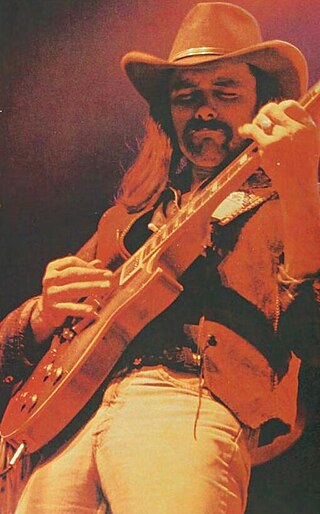
Forrest Richard "Dickey" Betts was an American guitarist, singer, songwriter, composer and founding member of the Allman Brothers Band. He assumed sole lead guitar duties during the peak of the group's commercial success in the mid-1970s and was the writer and singer on the Allmans' hit single "Ramblin' Man". Betts was inducted with the band into the Rock and Roll Hall of Fame in 1995. He was ranked No. 58 on Rolling Stone's 100 Greatest Guitarists of All Time list in 2003, and No. 61 on the list published in 2011.

The Allman Brothers Band is the debut studio album by American rock band the Allman Brothers Band. It was released in the United States by Atco Records' subsidiary Capricorn on November 4, 1969, and produced by Adrian Barber. Formed in 1969, the Allman Brothers Band came together following various musical pursuits by each individual member. Guitarist and bandleader Duane Allman moved to Jacksonville, Florida where he led large jam sessions with his new band, one he had envisioned as having two guitarists and two drummers. After rounding out the lineup with the addition of his brother, Gregg Allman, the band moved to Macon, Georgia, where they were to be one of the premiere acts on Capricorn.

Idlewild South is the second studio album by American southern rock band the Allman Brothers Band. Produced by Tom Dowd, the album was released on September 23, 1970 in the United States by Atco Records and Capricorn Records. Following the release of their 1969 debut, the Allman Brothers Band toured the United States extensively to promote the album, which had little commercial success. Their performances, however, did create positive word of mouth exposure that extended to more famous musicians, such as Eric Clapton, who invited group leader Duane Allman to contribute to his 1970 album Layla and Other Assorted Love Songs.

Brothers and Sisters is the fourth studio album by American rock band The Allman Brothers Band. Co-produced by Johnny Sandlin and the band, the album was released in August 1973 in the United States by Capricorn Records. Following the death of group leader Duane Allman in 1971, the Allman Brothers Band released Eat a Peach (1972), a hybrid studio/live album that became their biggest-selling album to date. Afterwards, the group purchased a farm in Juliette, Georgia, to become a "group hangout". However, bassist Berry Oakley was visibly suffering from the death of Duane, excessively drinking and consuming drugs. In November 1972, after nearly a year of severe depression, Oakley was killed in a motorcycle accident, making it the last album on which he played.

"Jessica" is an instrumental piece by American rock band the Allman Brothers Band, released in December 1973 as the second single from the group's fourth studio album, Brothers and Sisters (1973). Written by guitarist Dickey Betts, the song is a tribute to gypsy jazz guitarist Django Reinhardt, in that it was designed to be played using only two fingers on the left hand.
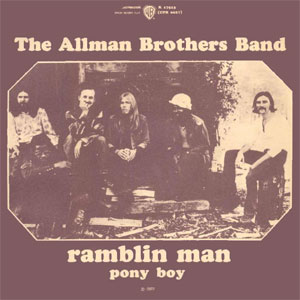
"Ramblin' Man" is a song by American rock band the Allman Brothers Band, released in August 1973 as the lead single from the group's fourth studio album, Brothers and Sisters (1973). Written and sung by the band's guitarist, Dickey Betts, it was inspired by a 1951 song of the same name by Hank Williams. It is much more grounded in country music than other Allman Brothers Band compositions, which made the group reluctant to record it. Guitarist Les Dudek provides guitar harmonies, and it was one of bassist Berry Oakley's last contributions to the band.
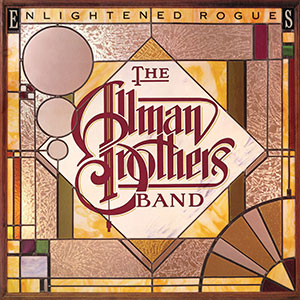
Enlightened Rogues is the sixth studio album by American rock band the Allman Brothers Band. Produced by Tom Dowd, the album was released in February 1979 in the United States by Capricorn Records and PolyGram Records elsewhere. The Allman Brothers Band had broken up in 1976 following internal turmoil, amplified by escalating drug use. The band members splintered into different acts — among those Great Southern, Sea Level, and the Gregg Allman Band. Guitarist Dickey Betts approached his bandmates in 1978 with the prospects of a reunion. It is the first to feature guitarist Dan Toler and bassist David Goldflies. Living together in Sarasota, Florida, they rehearsed and wrote the material for their next album in fall 1978.
Thom "Ace" Doucette is an American blues harmonica player from the Sarasota, Florida region. He is best known for having played with The Allman Brothers Band in the 1970s and later, although he was never an official member.
"In Memory of Elizabeth Reed" is an instrumental composition by the American group The Allman Brothers Band. It first appeared on their second studio album, Idlewild South (1970), released on Capricorn Records. The jazz-influenced piece was written by guitarist Dickey Betts, among his first writing credits for the group. Betts named it after a headstone he saw for Elizabeth Jones Reed Napier in Rose Hill Cemetery in the band's hometown of Macon, Georgia. Multiple versions of the composition have been recorded, with the version performed on the group's 1971 live album At Fillmore East generally considered the definitive rendition.
"Whipping Post" is a song by The Allman Brothers Band. Written by Gregg Allman, the five-minute studio version first appeared on their 1969 debut album The Allman Brothers Band. The song was regularly played live and was the basis for much longer and more intense performances. This was captured in the Allman Brothers' 1971 double live album At Fillmore East, where a 22-minute, 40-second rendition of the song takes up the entire final side. It was this recording that garnered "Whipping Post" spots on both the Rock and Roll Hall of Fame's 500 Songs that Shaped Rock and Roll list and Rolling Stone's list of "The 500 Greatest Songs of All Time", which wrote, "the song is best appreciated in the twenty-three-minute incarnation on At Fillmore East."
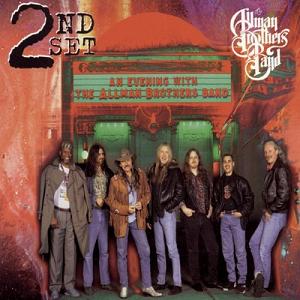
An Evening with the Allman Brothers Band: 2nd Set is a live album by the American rock group the Allman Brothers Band. It was recorded in 1992 and 1994, and released in 1995. The recording of "In Memory of Elizabeth Reed" was nominated for a Grammy Award for Best Pop Instrumental Performance at the 38th Annual Grammy Awards, but it lost to "Mariachi Suite" by Los Lobos. The recording of "Jessica" included on the album won a Grammy Award for Best Rock Instrumental Performance at the 38th Annual Grammy Awards in 1996.

Duane & Greg Allman is an album credited to Duane and Gregg Allman, released by Bold Records in May 1972. The release is essentially an album-length demo recording of the 31st of February, a Tallahassee-based folk rock band featuring drummer Butch Trucks, bassist David Brown, and guitarist Scott Boyer. The 31st of February formed in 1965 and released their first, self-titled album in 1968. This second recording, according to Trucks, was intended to be their second album. It features Duane Allman on guitar and Gregg Allman on vocals. The two had been performing with the 31st of February for several months.
Charles Scott Boyer II was an American singer-songwriter and guitarist. Boyer was best known for co-founding the band Cowboy. Boyer was born in Chenango, New York, and moved to Jacksonville, Florida in his youth.
References
- 1 2 Poe, Randy Skydog: The Duane Allman Story, pp. 26-27
- ↑ Poe, Randy Skydog: The Duane Allman Story, p. 27
- ↑ Poe, Randy Skydog: The Duane Allman Story, pp. 27-28
- ↑ Poe, Randy Skydog: The Duane Allman Story, p. 65
- ↑ Poe, Randy Skydog: The Duane Allman Story, pp. 66-67
- ↑ Poe, Randy Skydog: The Duane Allman Story, p. 68
- ↑ CD Baby: SCOTT BOYER: All My Friends
- ↑ "The Official Norton Buffalo Home Page". www.norton-buffalo.com. Archived from the original on 1999-11-24.
- ↑ Norton Buffalo and the Knockouts Archived 2006-01-05 at the Wayback Machine